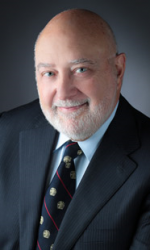December 19, 2018
December 2018 Newsletter

Carlos A. Pellegrini, MD, FACS Chief Medical Officer, UW Medicine and Vice President for Medical Affairs
It is with bittersweet emotion that I write my last message to you all. Since I began my journey at UW Medicine 26 years ago, I have been fortunate to be surrounded by the brightest minds in the country and have consistently been impressed by your dedication, innovation and compassion towards making the lives of our patients better. As I prepare to retire, many of you have asked me what I will remember most or what have been the greatest moments. I share with you the top three things: First, more than clinical accomplishments, more than honors and rewards, it is the personal relationships that this job has allowed me to have with all of you that is the greatest takeaway; the stories of your lives intertwined with mine make me the most thankful. The realization that you allowed me to enter your life and share many moments of work, advice, passion, and stories is a privilege I will always cherish.
Second, since being named CMO in 2015 and working to systematize care transformation, I have seen each of you play a role in one slice of the work that we call care transformation, devoting your energy, creativity, and hard work to make that small piece perfect, and then to make it fit into the whole; I have seen you take to being leaders and strive to think big, start small, and learn fast in efforts to improve our delivery of patient care and support the wise use of healthcare dollars. This has been a special privilege for me.
Third, when you put all the slices together, I have witnessed the positive impact this has made on our community, our school, and the care of our patients and nothing can make me more proud. As I move into the next chapter in my life and while it will no longer be here, I will continue to watch your great work and achievements from afar. It is with humble gratitude that I recognize and thank you all for helping me lay the path in establishing the UW Medicine Way. Thanks for all you do and I know that you will continue boldly in our mission — to improve the health of the public.
Speaking of achievements, I’d like to take the time to share with you in this month’s newsletter just some of the great results and progress you and your colleagues have forged this year around care transformation
2018 Care Transformation Achievements

Our post-acute care (PAC) strategy has continued to make improvements in care transitions from the inpatient setting to help reduce readmissions and length-of-stay (LOS) and return patients to home sooner.
- PAC Network expanded to include 17 skilled nursing facilities (SNF), two home health and hospice organizations, an adult day-health program, and a home care provider.
- Centralized clinical service provided > 5,800 visits.
- 205 hospital days of capacity created by the PAC Consult Service at UWMC since April 2018.
- At the end of FY18, Network SNFs responded 1.3 days faster to referrals and the median hospital LOS for patients discharged to Network SNFs was 10 days less than to non-Network SNFs.
Through empanelment, panel/gap management, care management, and primary care pathways and population approach to health (PATH), population health management works to serve populations as well as individual patients to prevent disease, promote health and reduce the burden of chronic illnesses.
- Outreach to 12,307 empaneled patients and scheduled 1,295 appointments from August 1 to Nov 30th, a 10% response.
- Engaged 8,500 Medicare Advantage patients centrally to close and achieve 4-star HEDIS (Healthcare Effectiveness Data and Information Set performance measures) ratings on care gaps, HCC risk capture and Annual Wellness Visits. On track to achieve 80% care gap closure at several clinics.
- Improved performance on 7 out of 9 Boeing quality metrics (including depression, diabetes and hypertensive control).
- Built program and began to furnish better care transitions through Transitional Care Management on all sub-populations with a recent hospital discharge – increased rate of post-discharge calls on average over four-month period from 7% to 59%. [July-November, 2018]
UW Medicine’s telehealth program uses emerging technology to improve patient health outcomes and advance provider education, including teleconferencing, in-home telemonitoring, and digital store-and-forward of data (or eConsults), images and/or videos.
- UW Medicine providers saw more than 18,000 telehealth patients, including in virtual clinics, provider-to-provider through eConsults and provider-to-patient via teleconsults.
- Virtual Urgent Care Clinic volume increased by 26%.
- UW Medicine specialists conducted more than 5,000 eConsults across 14 specialties, resulting in a 30% improvement in patient access across many specialties.
- Expanded teleconsults and eConsults to new partners and specialties, including: tele-jail (psychiatry), stroke, amputee, post-acute care, cardiology, infectious disease, and urology.
Our palliative care strategy seeks to provide palliative care to the right patients in the right location at the right time, leading to improved outcomes while optimizing resource utilization, and offering greater value for all.
- Tested over 18 screening palliative care screening tools.
- Created a screening process for General Inpatient Hospice (200% increase at UWMC) for patients at the end of life in our hospital, leading to improved quality for patients and families with demonstrated cost savings.
- Launched a continuous learning collaborative called the Palliative Care Quality Network at UWMC/HMC.
Standardization
Taking a patient-centered approach to systematically using evidence-based tools and techniques for common diseases/procedures helps us improve patient outcomes, decrease variability, increase consistency, realize reliable excellence, and reduce costs across the system.
- $3,070,616 in direct cost savings from care pathways across UW Medicine through Sept. ‘18.
- To date in FY19, the heart transplant pathway realized $888,762 in direct cost savings (July through Sept.).
- The blood pressure management algorithm went live in early 2018. Since implementation, hypertension control rates have improved by 10-15%.
- Developed three merit-based incentive payment system (MIPS) pathways in Q4 of CY18: Knee Arthroplasty, ST-Elevation Myocardial Infarction (STEMI), and Stroke.
Smart Innovation (Value Analysis + Technology Assessment) — an evidence-based, clinician-driven approach evaluating technology’s impact on patient, clinical, financial and system outcomes — is now a key component of of our Clinical Product and Smart Innovation (CPSI) program that is part of Project FIT (Financial Improvement and Transformation).
- Conducted 10 health technology assessments (HTAs) since June 2017.
- High-value technologies that were adopted indicated cost saving and improved patient outcomes, including microwave liver ablation reducing adverse events and number of procedures — resulting in estimated cost savings of $8,000 per patient.
- Uncertain technologies that were not adopted had significant cost savings and cost avoidance for UW Medicine, including $1.5 million in estimated cost avoidance per year on urine-based bladder cancer testing.
Patient-Reported Outcomes
Patient-reported outcomes (PROs) are an important complement to clinical assessments and allow us to “hear our patient’s voice” in all that we do. Evidence shows that PROs can improve the treatment of chronic conditions and more effectively prevent and treat complications of care.
- Medicare annual wellness visit (AWV): Health Risk Assessment (HRA) questionnaire built for administration via eCare and piloted in three clinics.
- Depression screening: Adaptable PHQ-2 → PHQ-9 questionnaire built for administration via eCare and piloted in one clinic.
- Depression care management: PHQ9 questionnaire built for administration via eCare and launched across Behavioral Health Integration Program (BHIP) teams.
- Total joint replacement: PRO reporting database developed to support population health and clinical use.
With a vision to become a national model for healthcare equity and reduce disparities in healthcare delivery, we are committed to embracing diversity, fostering inclusion, and advancing equity across our healthcare system for our patients and workforce in order to give everyone we serve the opportunity for good health outcomes.
- More than 1,000 UW Medicine leaders exposed to equity, diversity, and inclusion (EDI) history, issues and current work; six new EDI committees convened at the entity or department level.
- EDI Climate Survey: 12,128 staff and clinicians surveyed.
- Two community conversations convened: 100 community participants engaged.
- Five clinical improvement projects launched, including Transgender and Gender Non-Binary care program.